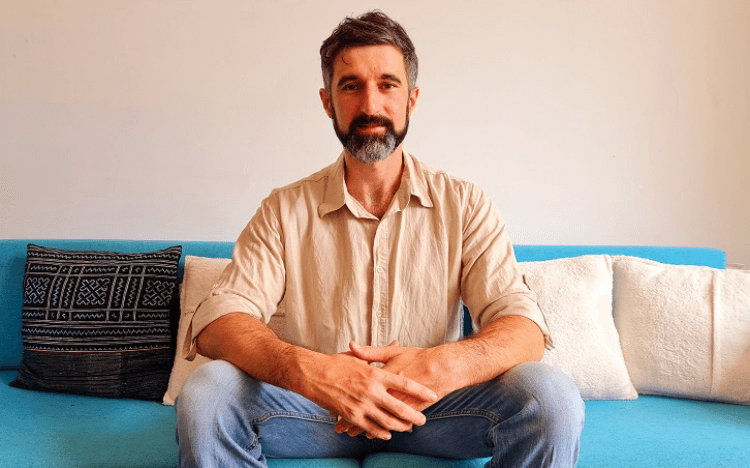Christopher had spent the decade before CEIBS working across China on franchise expansion for international kindergartens while working for a leading US educational publisher, and then as the head of operations for a prominent British international school—Dulwich College International—in Beijing.
It was the culmination of a pre-MBA career that Christopher had launched straight out of his philosophy undergrad. With no prior formal business education, he explains that the MBA can give you the business knowledge and cultural understanding you need to enhance your career abroad.
Why MBA: CEIBS
While he started working on campus expansion as head of operations for Dulwich College International, Christopher went from a back office role to project management liaising between architects, quantity surveyors, and large-scale procurement teams.
The step up after that would have been a role at director level, but Chris felt the necessary grounding in finance and core business knowledge for that level were missing. That’s when he decided to enroll on the CEIBS MBA—he’s one of many international students who stay in China for their degree.
Christopher says that having spent his entire career focused on China and education, an MBA was a good way to take a step back and assess his next career move.
“After being in China for 11 years I used business school as an opportunity to travel and explore other markets,” he explains.
How the CEIBS MBA syllabus builds your international credentials
The CEIBS MBA curriculum provides students with a deep dive into Chinese business, starting with the MBA case study method of teaching. CEIBS produces its own in-house China-focused case studies thanks to its Case Center.
Specific China Modules also take students to different parts of the country to learn about various business and cultural practices that have aided China’s market development. A trip to Shenzhen shows students the rise of a global innovation hub, for example, while a visit to Nanjing educates students on the globalization of Chinese companies.
In the classroom, Christopher explains that faculty expertise gives MBA candidates a new perspective on China and global business.
“I took a class about China within the world, and I remember feeling very inspired in that class,” he recalls. “Our professor emphasized the importance of cultural fluency, not just in one or two countries, but a minimum of three.”
That class encouraged Christopher to explore opportunities in the education sector in Africa. He landed a four-month fellowship in his penultimate semester with Moringa School in Kenya, a leading software skills accelerator in East Africa—he advised on growth strategy and market expansion in preparation for seed financing.
The bulk of Christopher’s finance knowledge came from CEIBS, and he explains that whereas someone from outside the country has surface level access to how things work there, CEIBS’ research-driven expertise gives students more granular insight.
“I’d never really heard highly articulate, research-driven economic perspectives from Chinese professors of macro and microeconomics, and that opened up a lot to me.”
After Africa, Christopher made the most of CEIBS’ “robust” overseas exchange program to join London Business School for his final semester. “Because CEIBS is the best business school in China a lot of people overseas interested in the Chinese job market want to come here,” Christopher adds, “so there’s a lot of reciprocity with some of the best schools in the world, who all have available seats for students to spend a semester abroad.”
Building a successful career in a foreign market
The vibrancy and early-stage atmosphere Christopher experienced in Kenya was exactly what he was looking for from his next role. While in London he met a group of Finnish entrepreneurs and joined their company, FinlandWay International Preschools, to set up early childhood centers in South East Asia, where he saw a similar energy building in the education sector.
That role took him to Vietnam to open a Finnish kindergarten. He then joined a coding school and worked on their expansion strategy. That was at the time of the COVID-19 pandemic and a lot of Christopher’s energy went into refining the online education offering of the organization and ensuring they remained solvent.
Christopher’s international career has kept him in Vietnam, where he’s currently the executive director for STREETS International, a nonprofit vocational education program that focuses on at risk youths in Vietnam. The organization runs an 18-month program that teaches students English and a US-certified hospitality curriculum to help them get jobs in international hotels.
“It’s something I feel brings a lot of my experiences together,” Christopher explains. It’s the peak of his international career, and is the result of the academic and cultural knowledge gained on the MBA and commitment to developing a few key attributes.
“[Succeeding in a foreign market] takes a great deal of empathy, humility, resilience, and listening,” he says. “There are equally valid or better approaches to the same problems in other countries and the more you travel and work internationally the more you develop that appreciation of other ways of doing things.”
“When you first go abroad, the benefit of that experience can’t be seen immediately, but the more you develop that and longer you spend working in different markets, I think it becomes easier to hold leadership positions and work with colleagues from completely different backgrounds who hold completely different world views.”








